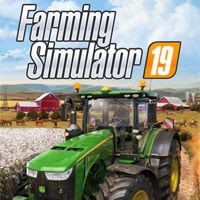Farming Simulator 19: Plants - what to cultivate first?
Farming Simulator 19 enables you can grow 13 types of plants. It's difficult to answer the question which plants should be grown to begin with, especially if you intend to invest in husbandry as well. If you are not very well familiar with the requirements of animals, it's worth taking a look at the Husbandry chapter in this guide.

One of the best sources of income at the beginning of the game (especially on small plots of land) is sugarcane. Get a special planter, a cheap harvester connected to a tractor and a capacious semi-trailer, and you'll reap a great early profit with little investment.
Besides: soybean is a good type of crop at the beginning, as is rapeseed. The reasons for this are:
- The optimal volume of crop (you don't need many large trailers at the beginning of the game - neither for harvesting plants from the field nor to transport them to a selling point) and good selling price;
- The ability to store them in silos;
- Use of basic machines: if you want to grow and harvest other plants, you can do it using almost the same equipment.

It's also a good idea to grow sunflower - you grow it just like "standard" grains, but you need to buy a planter and a harvester header: it can be a header for corn or a special sunflower header: the harvester moves at a speed of 15km/h.
If you're going to invest in animal husbandry, the good ideas in general are: grass (if you can afford it - it's not always worth sowing the whole field only with grass) and corn cultivation.

Grains such as wheat, barley and oats generate considerable profits, but only when you collect straw - which is a monotonous and time-consuming job. Root crops generate very large yields: it's hard to do without good machinery, capacious trailers and an optional belt system. For cotton, sugarcane and breeding poplar for wood chips, you need specialized machines that won't be used virtually anywhere else, and both plants have no uses other than to be sold at the point of purchase.
- Farming Simulator 19 Guide and Tips
- Farming Simulator 19: Game Guide
- Farming Simulator 19: FAQ
- Farming Simulator 19: Plants - what to cultivate first?
- Farming Simulator 19: Belt system - how does it work?
- Farming Simulator 19: Biogas Plant - why can't I use it?
- Farming Simulator 19: Vehicle's tank - how to fill?
- Farming Simulator 19: Saving the game - how to?
- Farming Simulator 19: New fields - how to buy?
- Farming Simulator 19: Fields - how to enlarge, merge?
- Farming Simulator 19: Tractor - which should I get first?
- Farming Simulator 19: Workers - how to hire?
- Farming Simulator 19: Tree stumps, bushes - how to remove?
- Farming Simulator 19: New tractor - what to pay attention to while buying?
- Farming Simulator 19: Combine harvester capacity - how to increase?
- Farming Simulator 19: Vehicles, machinery - how to repair?
- Farming Simulator 19: Vehicles - how to sell?
- Farming Simulator 19: Semi-trailers - can I combine them?
- Farming Simulator 19: Leasing - how does it work?
- Farming Simulator 19: FAQ
- Farming Simulator 19: Game Guide
You are not permitted to copy any image, text or info from this page. This site is not associated with and/or endorsed by the developers and the publishers. All logos and images are copyrighted by their respective owners.
Copyright © 2000 - 2025 Webedia Polska SA for gamepressure.com, unofficial game guides, walkthroughs, secrets, game tips, maps & strategies for top games.
